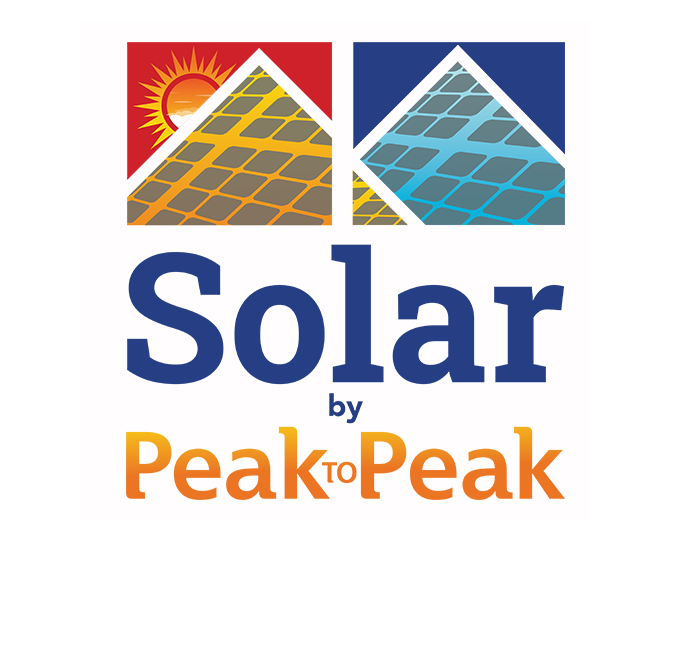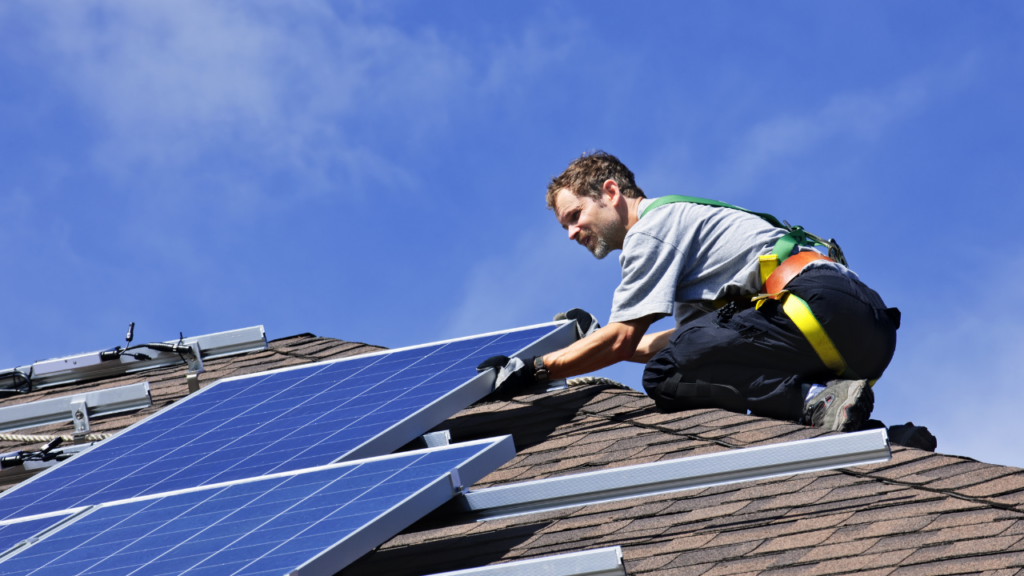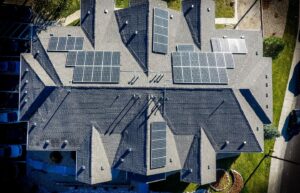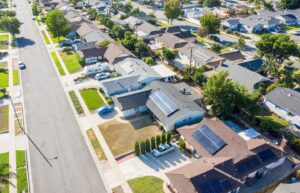Did you know that solar panel financing options, including federal tax credits and tax rebates, have made it possible for homeowners in Aurora, Colorado, and beyond to embrace clean energy without breaking the bank? With these tax incentives and the assistance of loan providers, more and more people are able to afford the installation of solar panels.
Understanding the basics of solar panel financing is crucial for homeowners looking to save on their energy bills. Before making any decisions, it’s important to consider how the lender will factor in the cost of the solar panels when determining your mortgage.
There are various financing options available, including power purchase agreements (PPAs) and loans specifically designed for solar installations. These options can help you save money on your energy bill and mortgage while providing cash for your solar project.
By exploring options such as solar installers and solar financing options such as those offered by Solar by Peak to Peak, homeowners can find the best fit for their solar installation needs and budget. This allows consumers to make informed decisions about their solar projects.
Pros and Cons of Different Financing Options
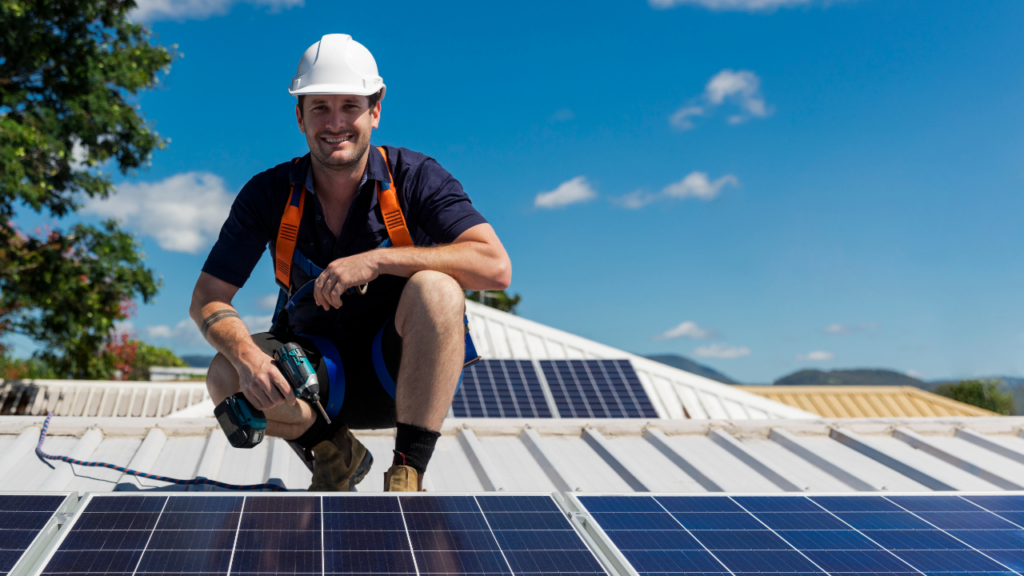
There are various options to consider. Each option, including cash, solar financing, and solar loans, has its own set of advantages and disadvantages that cater to different financial situations and preferences. Additionally, considering different options for advertising is essential. Let’s take a closer look at the pros and cons of these different financing options: cash, solar loans, solar leases, and advertisements.
Loans
Pros:
- With a loan, you can own the solar panels outright from the beginning and pay with cash.
- Interest rates for solar panel loans are typically lower compared to other forms of credit.
- You may be eligible for tax credits or incentives when you purchase solar panels with a loan.
Cons:
- Upfront costs for solar financing can be higher since you’ll need to make a down payment or pay for installation fees with solar loans or solar leases.
- Taking out a solar loan means taking on debt, which may not be ideal for everyone. However, solar leases offer an alternative option for those who prefer not to take on debt.
- Loan approval, whether for solar loans or solar leases, depends on your credit score, and those with poor credit may have difficulty securing favorable terms.
Leases
Pros:
- Leasing allows you to enjoy the benefits of solar panels without any upfront costs.
- The leasing company typically covers maintenance and repairs for your solar loan.
- Solar loan lease payments are often lower than monthly utility bills, providing immediate savings.
Cons:
- Since you don’t own the solar panels, you won’t qualify for tax credits or incentives.
- Solar leases typically come with long-term contracts that can last up to 20 years, limiting flexibility if you decide to move or sell your home. However, with a solar loan, you have more options and control over your solar energy system.
- Over time, lease payments may exceed the cost of purchasing solar panels outright.
Power Purchase Agreements (PPAs)
Pros:
- Solar leases and solar loans offer similar benefits as PPAs in terms of no upfront costs and maintenance coverage by the provider.
- If the solar panels produce less energy than expected, your monthly payment will decrease accordingly.
Cons:
- Like leases, PPAs don’t provide ownership of the solar panels or access to tax credits.
- Long-term contracts, such as a solar loan, can restrict your options if you want to make changes to your energy system.
- PPAs and solar loans may have escalating payments over time, which could diminish potential savings.
Cash Purchase
Pros:
- Buying solar panels outright with cash offers the highest long-term savings.
- You immediately benefit from tax credits and incentives.
- With ownership, you have full control over your solar panel system.
Cons:
- The upfront cost of a solar loan can be substantial and may not be feasible for everyone.
- If you sell your home before reaching the solar loan breakeven point, you might not recoup the full investment.
- Maintenance and repairs will be your responsibility.
When evaluating financing options for solar panels, it’s crucial to consider factors such as interest rates, ownership, long-term savings, upfront costs, and flexibility. Assessing these aspects, such as solar loans, will help you determine which option aligns best with your financial goals and circumstances.
While some individuals may opt for upfront cash payments, others may find a solar loan to be a more suitable option. It’s important to consider your own financial situation and goals before deciding on the best approach for you. Take the time to research and compare different financing options to find the best fit for you.
Solar Panel Loans: Key Considerations
If you’re considering installing solar panels on your property in Aurora, Colorado, financing options are an important aspect to consider. One popular choice is solar panel loans, which allow you to own the system outright while spreading payments over time. However, before diving into this option, there are several key considerations to keep in mind.
Interest Rates and Loan Terms
When exploring solar panel loans, it’s crucial to pay attention to the interest rates and loan terms offered by different lenders. The interest rate will determine how much you’ll ultimately pay for the loan over its duration. Lower interest rates can save you a significant amount of money in the long run. Longer loan terms may result in smaller monthly payments but could lead to paying more overall due to accruing interest.
Credit Requirements
Before applying for a solar panel loan, take note of the credit requirements set by lenders. Some lenders may have stricter criteria than others when evaluating your creditworthiness. If your credit score is less than stellar or if you have a limited credit history, it’s essential to find lenders who cater specifically to individuals with lower credit scores or offer alternative financing options such as personal loans.
Available Incentives
One advantage of financing solar panels is that there may be various incentives available that can help offset the cost. It’s crucial to research and understand what incentives are accessible in your area and how they can benefit you financially. These incentives might include federal tax credits, state rebates or grants, utility company incentives, or net metering programs. Taking advantage of these opportunities can significantly reduce the overall cost of installing solar panels.
Comparing Multiple Loan Offers
To ensure you secure the most favorable terms for financing your solar panels, it’s advisable to compare multiple loan offers from different lenders. This will give you a comprehensive understanding of what each lender has to offer in terms of interest rates, loan terms, and credit requirements. By doing so, you can make an informed decision and choose the loan that aligns best with your financial goals.
Repayment Terms
Understanding the repayment terms of a solar panel loan is essential to managing your finances effectively. Consider factors such as monthly payment amounts, whether the loan offers fixed or variable interest rates and any penalties for early repayment. By carefully evaluating these terms, you can ensure that the loan aligns with your budget and financial capabilities.
Exploring Solar Leasing as a Viable Option
Solar power is an increasingly popular choice for homeowners in Aurora, Colorado, and beyond. But what if you don’t want to commit to purchasing a solar system outright? That’s where solar leasing comes in. It offers an alternative way to finance solar panels while still reaping the benefits of renewable energy. Let’s delve into the details and explore why solar leasing can be a viable option.
Leasing Allows Homeowners to Enjoy the Benefits of Solar Power Without Owning the System
With a solar lease, you essentially rent the solar panels from a company instead of buying them outright. This means you can enjoy all the advantages of using clean, renewable energy without having to worry about the upfront costs or maintenance responsibilities that come with ownership. It’s like renting a house instead of buying one; you get to enjoy living there, but you’re not responsible for repairs or upgrades.
Monthly Lease Payments are Often Lower than Loan Payments but May Not Result in Long-Term Savings
One major advantage of opting for a solar lease is that monthly payments are generally lower than loan payments. This makes it more affordable for homeowners who may not have the financial resources to purchase a system outright or qualify for favorable loan terms. However, it’s important to note that while leasing may provide immediate cost savings on your electricity bill, it may not lead to significant long-term savings compared to owning your own system.
Lease Agreements Typically Include Maintenance Responsibilities and End-of-Term Buyout Options
When entering into a solar lease agreement, it’s crucial to carefully review the terms and conditions. Most leases include provisions outlining your responsibilities for maintaining the system during the lease period. Many leases offer an end-of-term buyout option, giving you the opportunity to purchase the system at a reduced price once the lease term expires. This can be beneficial if you decide that you want to continue enjoying the benefits of solar power after the lease is up.
Solar leasing can be a viable option for homeowners in Aurora, Colorado, who want to go solar without the upfront costs of ownership. However, it’s important to weigh the pros and cons before making a decision. Here are some key considerations:
Pros:
- Lower monthly payments compared to loan payments.
- Immediate cost savings on electricity bills.
- There are no upfront costs or maintenance responsibilities.
Cons:
- Potential lack of long-term savings compared to owning a system.
- Limited control over the equipment and system design.
- Lease terms may restrict your ability to make changes or upgrades.
Government Incentives and Rebates for Financing
Governments around the world are taking proactive steps to promote the adoption of solar energy. As a result, they offer various incentives like tax credits, grants, or rebates to encourage individuals and businesses to invest in solar panels. These incentives can significantly reduce the overall cost of installing solar panels and make them more affordable for homeowners.
One important step in financing solar panels is researching local incentives. Each region may have different programs and offerings, so it’s crucial to understand what financial incentives are available in your area. For example, if you live in Aurora, Colorado, you can explore the financial incentives provided by the city or state government.
Understanding eligibility criteria and application processes is also essential when considering government support for financing solar panels. Some incentives may have specific requirements based on factors such as income level or property type. By familiarizing yourself with these criteria, you can ensure that you meet all necessary qualifications before applying for any financial assistance.
Here are some key points to consider when exploring government incentives and rebates for financing solar panels:
Tax Credits
- Governments often provide federal tax credits as an incentive for investing in renewable energy sources like solar power.
- These tax credits allow homeowners to deduct a percentage of their solar panel installation costs from their federal taxes.
- Researching federal tax credit options will help you understand how much money you could potentially save on your taxes.
Grants and Rebates
- In addition to tax credits, governments may offer grants or rebates specifically designed to offset the cost of purchasing and installing solar panels.
- These grants or rebates can be substantial and significantly reduce your out-of-pocket expenses.
- It’s worth exploring both federal and local grant programs or rebate offers that might be available to you.
Loan Programs
- Some governments provide loan programs specifically tailored for renewable energy projects like installing solar panels.
- These loan programs typically offer low-interest rates and favorable terms to make financing more accessible.
- Researching loan providers and understanding the application process will help you secure the most suitable loan for your needs.
Home Improvement Loans
- Another option for financing solar panels is through home improvement loans.
- These loans allow homeowners to borrow money specifically for energy-efficient upgrades, including installing solar panels.
- By refinancing or taking out a home equity loan, you can access funds to cover the upfront costs of solar panel installation.
Taking advantage of government incentives and rebates can significantly reduce the financial burden of installing solar panels. By researching local programs, understanding eligibility criteria, and exploring different financing options such as tax credits or grants, you can make solar energy more affordable for your home.
Remember to consult with experts in the field or reach out to local authorities who can provide guidance on available incentives in your area.
Evaluating the Cost-Effectiveness of Financing Options
To determine the best way to finance solar panels, it’s crucial to evaluate the cost-effectiveness of different financing options. Calculating the return on investment (ROI) is a key metric that helps determine which option provides better long-term savings.
Factors such as electricity rates, system performance, maintenance costs, and potential resale value all play a role in the cost-effectiveness analysis. By considering these factors, individuals can make an informed decision that aligns with their financial goals.
Calculating Return on Investment (ROI)
Calculating ROI involves assessing the financial benefits gained from investing in solar panels compared to the initial costs. This analysis helps determine how long it will take for the investment to pay for itself and start generating savings.
To calculate ROI, one must consider several variables:
- Electricity Rates: The current utility costs in your area significantly impact your potential savings. Higher electricity rates mean greater potential savings from solar panel installation.
- System Performance: The efficiency and output of your solar panel system affect how much energy you generate and subsequently save on electricity bills.
- Maintenance Costs: Factoring in any maintenance or repair expenses over time is essential for an accurate ROI calculation.
- Potential Resale Value: Solar panels can increase the value of your property if you decide to sell it in the future. This added value should be considered when evaluating ROI.
By accounting for these variables, individuals can estimate their potential return on investment and assess which financing option offers greater long-term benefits.
Comprehensive Evaluation for Informed Decision-Making
A comprehensive evaluation of financing options ensures that individuals select a method that suits their specific needs and financial goals. Here are some aspects to consider during this evaluation:
- Equity vs. Loan Financing: Determine whether using equity or taking out a loan is more suitable for your financial situation. Equity financing involves using personal funds or home equity to pay for solar panels, while loan financing allows you to spread the cost over time.
- Credit Score: Your credit score can impact the interest rate and terms of a loan. A higher credit score may result in more favorable financing options.
- Loan Amount and Interest Rate: Consider the total loan amount as well as the interest rate offered by different lenders. Compare these rates to find the most affordable option.
- Work with Set Rates: Some financing options offer fixed interest rates, providing stability and predictability in monthly payments. This can be beneficial for budgeting purposes.
By thoroughly evaluating these factors, individuals can make an informed decision about which financing option is best suited to their needs and financial circumstances.
Long-Term Financial Benefits of Solar Panels
Solar panels offer a multitude of long-term financial benefits that make them an excellent investment for homeowners. Let’s explore these advantages in more detail:
Reduced or Eliminated Monthly Electricity Bills
One of the most significant financial benefits of solar panels is their ability to reduce or even eliminate monthly electricity bills. By harnessing the power of the sun, solar panels generate clean energy that can power your home. This means you rely less on traditional electricity sources, resulting in substantial savings over time. Imagine not having to worry about those hefty electricity bills anymore!
Increased Home Value
Investing in solar panels can also boost the value of your home. Many homebuyers are increasingly interested in properties equipped with renewable energy systems like solar panels. These systems demonstrate a commitment to sustainability and energy efficiency, making your home more appealing to potential buyers if you ever decide to sell. So not only do you enjoy the benefits while living in your home, but you also reap the rewards when it comes time to sell.
Reduced Carbon Footprint
By utilizing solar power, you contribute significantly towards reducing carbon emissions and protecting the environment. Solar energy is clean and renewable, unlike fossil fuels that release harmful greenhouse gases into the atmosphere when burned for electricity generation. Choosing solar panels as a source of energy helps combat climate change and create a greener future for generations to come.
Protection Against Rising Energy Costs
Energy costs have been on an upward trajectory for years, and they show no signs of slowing down. However, by investing in solar panels now, you can protect yourself against these rising costs. Solar panels provide a stable and predictable source of energy that allows you to become less dependent on fluctuating utility prices. As utility rates continue to rise, your investment in solar pays off even more.
Decades of Clean Energy Production and Financial Returns
Solar panels have an impressive lifespan that allows for decades of clean energy production and financial returns. With proper maintenance, solar panels can last for 25 years or more, providing you with reliable energy savings for a long time. This not only ensures that you recoup your initial investment but also allows you to enjoy the benefits of clean energy for many years to come.
What is the Best Way to Finance Solar Panels?
So, what’s the best way to finance solar panels? Well, there isn’t a one-size-fits-all answer. It ultimately depends on your specific circumstances and preferences. Take into account factors such as your credit score, available funds for upfront costs, desired level of ownership or flexibility, and long-term savings potential. To make an informed choice, consider consulting with solar energy experts or financial advisors who can guide you through the decision-making process.
Solar by Peak to Peak is your trusted partner in solar financing. We’re dedicated to making solar energy accessible to all, with tailored financing options designed to suit your unique circumstances.
Whether you’re considering a system purchase or need a solar loan, our expert team is here to simplify the process for you. We’ll help you choose the perfect solution for your home and budget. But it’s not just about saving on electricity bills; it’s about investing in a cleaner, greener future. It’s about reducing your carbon footprint and making a positive impact on our planet.
Join us on this journey to sustainable energy. Contact Solar by Peak to Peak today and discover the incredible benefits of solar financing. Let’s shine a brighter, cleaner future together!
